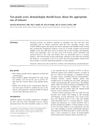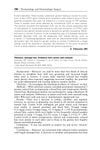3 citations,
May 2009 in “International Journal of Cosmetic Science” Relaxer treatments damage African–American hair, with commercial products causing more harm than lab-made solutions.
 4 citations,
July 2016 in “Journal of cosmetic dermatology”
4 citations,
July 2016 in “Journal of cosmetic dermatology” Dermatologists should use hair relaxers carefully to avoid hair and scalp damage, following specific guidelines for application and maintenance.
February 2022 in “Fibers” Scientists created a non-toxic, sugar-based hair product that can style hair without damage.
 17 citations,
January 2015 in “Current problems in dermatology”
17 citations,
January 2015 in “Current problems in dermatology” Understanding and treating hair disorders in different ethnic groups requires knowledge of specific hair care practices and hair characteristics.
4 citations,
January 2022 in “Cosmetics” Avoid high-tension styles and use professional treatments to reduce hair damage and health risks.
 9 citations,
August 2013 in “Facial Plastic Surgery Clinics of North America”
9 citations,
August 2013 in “Facial Plastic Surgery Clinics of North America” Recognize and treat hair loss conditions that mimic androgenetic alopecia by identifying warning signs and using proper tools.
 March 2010 in “Cosmetic Dermatology”
March 2010 in “Cosmetic Dermatology” Hair straightening methods have advanced to improve effectiveness and reduce damage, but still rely on heat and chemicals.
 October 2015 in “Cosmetic Dermatology”
October 2015 in “Cosmetic Dermatology” Hair straightening changes hair structure and can cause damage if done wrong, but improvements in the methods are expected to continue.
 72 citations,
July 2003 in “Journal of cosmetic dermatology”
72 citations,
July 2003 in “Journal of cosmetic dermatology” Frequent hair coloring and styling can damage hair and cause breakage or loss.
 1 citations,
July 2018 in “Elsevier eBooks”
1 citations,
July 2018 in “Elsevier eBooks” Avoid chemical and physical damage to protect hair.
7 citations,
October 2020 in “International Journal of Cosmetic Science” Different sizes of keratin peptides can strengthen hair, with smaller ones possibly increasing volume and larger ones repairing damage.
73 citations,
October 2013 in “International Journal of Cosmetic Science” Chemical hair straightening can damage hair and health, needing safer alternatives and stricter regulations.
53 citations,
July 2016 in “Cosmetics” Future hair cosmetics will be safer and more effective.
 October 2024 in “Cosmoderma”
October 2024 in “Cosmoderma” Proper hair care and suitable products are essential for men's scalp health and well-being.
18 citations,
July 2015 in “Journal of cosmetic dermatology” Straightening and coloring hair, especially with sodium hydroxide, greatly increases protein loss.
2 citations,
January 2022 in “Anais brasileiros de dermatologia/Anais Brasileiros de Dermatologia” Chemical hair straighteners can cause scalp and hair damage, but long-term effects are unclear.
 January 2011 in “Yearbook of Dermatology and Dermatologic Surgery”
January 2011 in “Yearbook of Dermatology and Dermatologic Surgery” Hair relaxers are linked to reduced cystine levels and potential hair damage.
November 2022 in “International journal of trichology” Glyoxylic acid straighteners cause more protein loss but have similar hair strength effects as traditional alkaline straighteners.
 60 citations,
April 2018 in “Clinical, cosmetic and investigational dermatology”
60 citations,
April 2018 in “Clinical, cosmetic and investigational dermatology” Tight hairstyles and chemical relaxers can cause hair loss known as traction alopecia.
 July 2012 in “Springer eBooks”
July 2012 in “Springer eBooks” The document concludes that proper diagnosis and treatment of nonscarring alopecias can improve quality of life and hair regrowth is possible as the hair follicle remains intact.
 75 citations,
March 2009 in “Journal of The American Academy of Dermatology”
75 citations,
March 2009 in “Journal of The American Academy of Dermatology” CCCA is a hair loss type affecting African women, possibly caused by grooming and chemicals, with various treatments and needing more research.
 55 citations,
October 2003 in “Dermatologic Clinics”
55 citations,
October 2003 in “Dermatologic Clinics” Different hair care practices and conditions affect African American hair and scalp health, requiring specialized knowledge for treatment.
 4 citations,
January 2021 in “Skin appendage disorders”
4 citations,
January 2021 in “Skin appendage disorders” Hair straightening can damage hair and pose health risks, including exposure to carcinogens and hair loss.

Afro-textured hair is more fragile and prone to certain scalp conditions, requiring careful treatment and more research for effective management.
 76 citations,
November 2010 in “Journal of The American Academy of Dermatology”
76 citations,
November 2010 in “Journal of The American Academy of Dermatology” Some African American women's central scalp hair loss is linked to genetics and past fungal scalp infections, with more research needed on other causes.
 20 citations,
October 2013 in “British Journal of Dermatology”
20 citations,
October 2013 in “British Journal of Dermatology” The document concludes that clinicians should be aware of common hair and scalp disorders in women of African descent and that more research is needed to develop effective treatments.
 57 citations,
September 2005 in “International Journal of Dermatology”
57 citations,
September 2005 in “International Journal of Dermatology” Frequent use of chemical hair relaxants is linked to increased scarring hair loss in Nigerian women.
 21 citations,
July 2002 in “Clinical and Experimental Dermatology”
21 citations,
July 2002 in “Clinical and Experimental Dermatology” Hair care products don't cause hair loss if used correctly.
 13 citations,
September 2016 in “Cosmetics”
13 citations,
September 2016 in “Cosmetics” Hair care cosmetics affect hair health; know products, ingredients, and procedures.
 59 citations,
August 2010 in “Journal of The American Academy of Dermatology”
59 citations,
August 2010 in “Journal of The American Academy of Dermatology” Certain hairstyles and less hair oil use in African American girls can lead to scalp conditions like traction alopecia and seborrheic dermatitis.




















